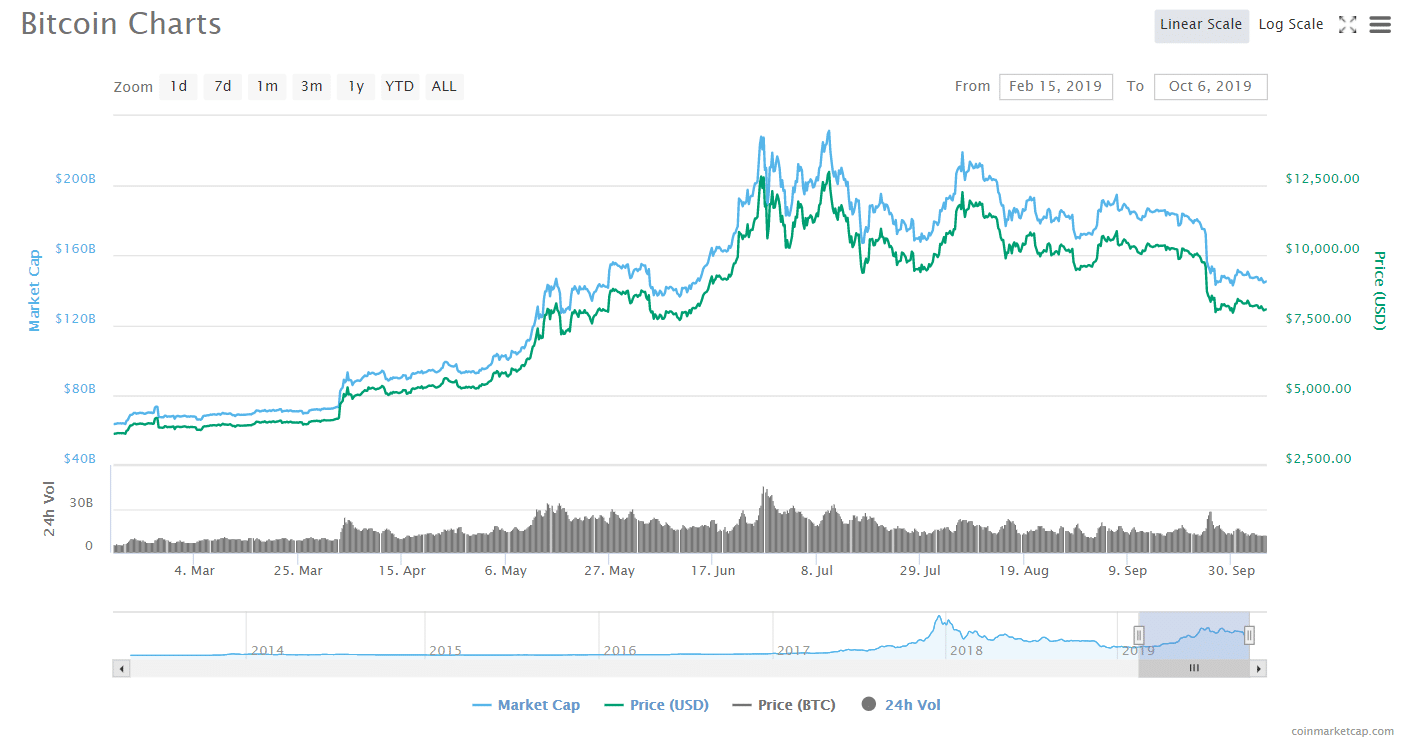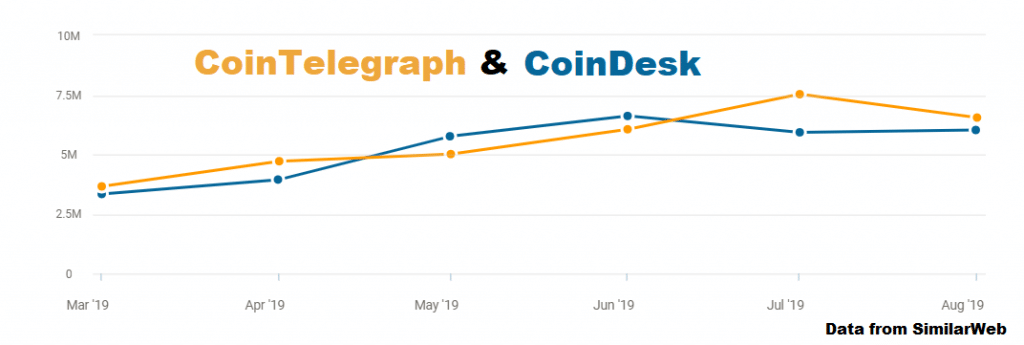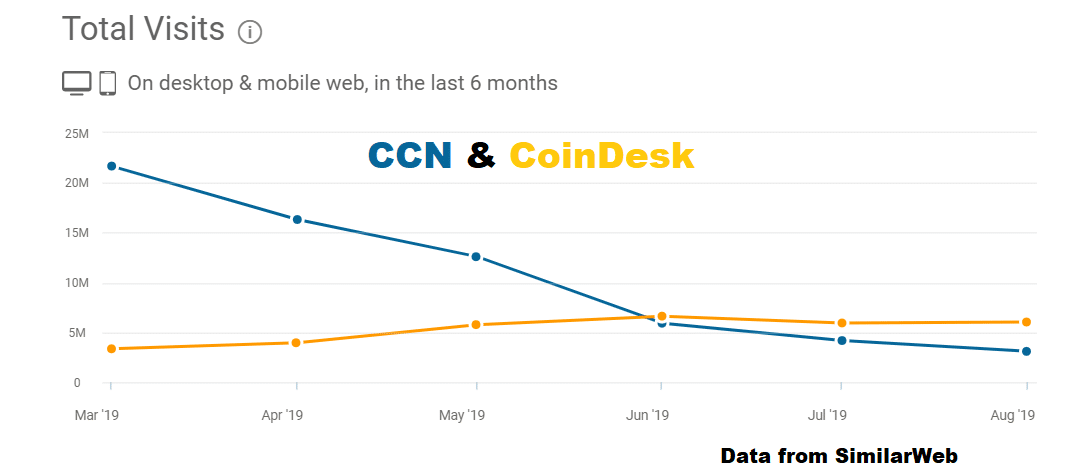This is the second article in a series on crypto news media. Be sure to check out the first article, too: "Crypto News Media Has Had to 'Get Creative' to Survive." As cryptocurrency markets have fluctuated so heavily over the past several years, so too have the substrates that have formed within the cryptocurrency industry: among them, advertising and news media. News media and advertising have a particularly important relationship with cryptocurrency markets: indeed, It’s a sort of “chicken and the egg” situation: are cryptocurrency prices driven by increased traffic to cryptocurrency news sites, or are higher amounts of traffic on news sites a result of higher cryptocurrency prices? Or, perhaps, are there other factors influencing the way that information is created and spread within the cryptosphere that may be having an effect on market prices? Or--if all of these things can be true at different times--what do traders, reporters, and readers need to be aware of? And what can crypto sites do if their traffic has taken a hit?
How is crypto web traffic affected by price fluctuations?
Whether traffic drives prices or prices drive traffic, looking at the data seems to reveal a direct correlation on some cryptocurrency news sites: higher prices mean more web traffic. “As any ‘traded’ commodity, public interest and PR always have effects on price, and this is not unique to crypto,” said Itai Elizur, Chief Operating Officer at Inbound Junction and MarketAcross, to Finance Magnates. However, “the days of a 200% ‘moon’ due to a non-existent partnership (such as the famous IOTA and Microsoft story) are gone,” Elizur said. “But when real things happen, such as earlier this month, when the bitcoin smart contracts platform RSK bought Taringa, the leading LATAM based Facebook competitor, you saw that the news story did have a decent short term effect on the price, but nothing crazy.”

Daniel Ameduri, financial analyst and co-founder of Future Money Trends.
Daniel Ameduri, financial analyst and co-founder of Future Money Trends, explained to Finance Magnates that this is largely due to the fact that the market is driven by speculation: “Speculators buy and sell on headlines and are easily influenced because they are gambling,” adding that this is not unique to crypto: “many other assets are also influenced by the minute by headlines, like stocks, bonds, and even gas prices.” On the other hand, though, news can’t have such a big effect on price if no one is reading it: "crypto prices are more of a driver of web traffic than the other way around," said John Lewis, CEO & Founder of Pitch Proper, to Finance Magnates. “The bigger the price, the more people want to be involved...take it from Andreas Antonopolous, who attends many crypto and bitcoin events--when prices are high there are many attendees; when prices tank, nobody comes.” In any case, there does seem to be a correlation between traffic on certain crypto news sites and coin prices. For example, when compared with Bitcoin prices, data from SimilarWeb shows that web traffic on several major cryptocurrency news sites received more traffic when the price of Bitcoin rose, and less traffic when it fell.


John Lewis, CEO & Founder of Pitch Proper.
For example, traffic on both CoinTelegraph and CoinDesk rose and fell in correlation with the price of Bitcoin over the last six months: when BTC started to come up in April, the number of site visits increased; when the price plateaued between $9000 and $11,000 starting in June, traffic to the sites began to level off. Traffic on CoinTelegraph has taken a dip over the last month as the price of Bitcoin has slid to roughly $8000.

Total visits from desktop and mobile devices over the last six months.
A decrease in web traffic could be due to market correction
However, not every crypto-related content site has had such a straightforward connection. Take, for example, NewsBTC--data from SimilarWeb shows that traffic to the site has steadily decreased in spite of upward price movements in the cryptosphere.

Amedeo Moscato, former Global Chief Operating Officer of DX.exchange and Playtech Plc. Executive, who also serves as the current Chief Executive and Founder of Soho Media Ltd., told Finance Magnates that falls in web traffic such as this one could be due to the natural maturation of an industry that is currently recovering from a hype-bubble.

Amedeo Moscato, former Global Chief Operating Officer of DX.exchange and Playtech Plc. Executive; current Chief Executive and Founder of Soho Media Ltd.
“I don't think that we are seeing a decrease going back two years from now,” he said to Finance Magnates. “I believe that we saw an over-interest in the industry growing from the end of 2016 due to the crypto buzz, then a strong explosion during 2017, going through 2018 moderate stable traffic over major sites in the industry and then a decrease in 2019. So, our perspective was distorted.” “All this reflects one simple thing: fast-growing hype and then decreasing interest in the industry. People lost money with crypto; some made a fortune. Most average users do not trust the crypto industry anymore, [and are therefore less interested in] industry news, and this is the primary cause we saw a decrease in site traffic. If you check Google trends, for example, the number of searches related to the keyword ‘Bitcoin’ has collapsed in the last 12-18 months. (sic)"
Google's ad ban and algorithm-rewrites may have had an effect
Itai Elizur told Finance Magnates that prices are not necessarily the most powerful force affecting web traffic. “The much talked about ‘google crackdown”’ on Blockchain and crypto sites had a much larger effect,” Elizur said, referring to several actions that Google has taken over the last two years. “I personally know sites who went from 1M+ visitors a month to almost 50K - mainly from loss of google rankings and google news syndications.” Indeed, Google has taken steps to prevent the promotion of cryptocurrency-related scams and the spread of “fake news” more generally that may have affected web traffic to certain cryptocurrency industry websites. A number of websites and other platforms followed suit: Facebook, SnapChat, MailChimp, and others placed their own version of a cryptocurrency ad ban. The first major strike that Google took against the industry was an outright ban on crypto-related ads on Google Adwords back in March of 2018. At the time, Scott Spencer (Google’s director of sustainable ads) cited a need to protect its customers from fraudulent offerings: “we don’t have a crystal ball to know where the future is going to go with Cryptocurrencies , but we’ve seen enough consumer harm or potential for consumer harm that it’s an area that we want to approach with extreme caution,” he told CNBC. Then, in September of 2018, Google modified the ban. According to the update, “regulated cryptocurrency exchanges” were now allowed “to advertise in the United States and Japan.”

Itai Elizur, Chief Operating Officer at Inbound Junction and MarketAcross.
“Advertisers will need to be certified with Google for the specific country in which their ads will serve,” the updated policy reads. “Advertisers will be able to apply for certification once the policy launches in October [2018].”
Google’s June 2019 core update could have negatively affected crypto sites
Some sources within the cryptocurrency industry have also claimed that Google’s June 2019 Core Update has negatively affected the rate of traffic to certain cryptocurrency industry news sites, in spite of the fact that Google said that the update should not have had a major effect on search results: Danny Sullivan, Google’s publish search liaison, tweeted that the update was “nothing special or particular ‘big.’ It's the usual type of core updates that we regularly do. (sic)”
Nothing special or particular "big." It's the usual type of core updates that we regularly do. We just wanted to be more proactive. Rather than people scratching their heads after-the-fact and asking "hmm?," we thought it would be good to just let folks know before it rolled out.
— Danny Sullivan (@dannysullivan) June 2, 2019
In fact, cryptocurrency news media site CCN went so far as to say in June that it would be shutting down (“cause of death: Google”) after the update seems to have caused a serious drop in traffic from mobile sites. (At press time, the site was still up and running.) “Google’s June 2019 Core Update rolled out on June 3th 2019 and CCN’s traffic from Google searches dropped more than 71% on mobile overnight,” a post from the site reads. The update also appeared to have caused a 34.6% drop in traffic on CoinDesk and a 21.1% drop on CoinTelegraph. However, crypto-related sites were not the only sites to have been negatively impacted by the core update. UK-based news site The Daily Mail saw a 43% drop in its traffic overnight. Barry Schwarts from Search Engine Land told CCN at the time that “people are speculating it has to do with the ads, the site speed, the content, the political slant, and so forth.” In the same post, Jonas Borchgrevink, founder of CCN, wrote that “We Are Anti-Elite, We Are Anti-Centralization. (sic) While I won’t speculate whether or not this might have affected our site, I would certainly hope Google isn’t actively suppressing journalism.” However, while the June update may have accelerated a decline in traffic, it seems that CCN was experiencing drops in traffic to its site months before Google’s June 2019 update. According to data from SimilarWeb, the site had more than triple the traffic of CoinDesk in March of this year; at press time, CCN had roughly half of the traffic that CoinDesk had.

This could be an indication that Google’s March 2019 Core Update could have also had a negative effect on CCN and perhaps other cryptocurrency news sites as well.
This week, we released a broad core algorithm update, as we do several times per year. Our guidance about such updates remains as we’ve covered before. Please see these tweets for more about that:https://t.co/uPlEdSLHoXhttps://t.co/tmfQkhdjPL
— Google SearchLiaison (@searchliaison) March 13, 2019
What to do if your site traffic has taken a hit
Google’s past advice for upping rankings has been rather scant: “there’s no ‘fix’ for pages that may perform less well other than to remain focused on building great content,” a post from the site says. “Over time, it may be that your content may rise relative to other pages.”
Sometimes, an update may be more noticeable. We aim to confirm those when we feel there is actionable information that content owners might take. For example, when our Speed Update happened, with gave months of advanced notice and advice….https://t.co/Nwi8I9rooP
— Google SearchLiaison (@searchliaison) October 11, 2018
Of course, this rather cheeky lately statement does not address the massive industry that has arisen around the art of “SEO,” or search engine optimization. Savvy companies across every industry work hard to design sites and create content that is more likely to rank higher in search results. Afik Rechler, VP of business development at InboundJunction and MarketAcross, told Finance Magnates that the best way to accomplish this is to “follow Google's SEO practices.”

Afik Rechler, VP of business development at InboundJunction and MarketAcross.
Here’s what that looks like on a practical level: ‘perform technical audits to ensure your site is 100% Google friendly, plus, make sure to optimize your content to target specific keywords that people are looking for. Use internal links to send ‘link juice’ to important pages and use other SEO technical practices such as decreasing your page speed load time.”
”Content is king”
At the end of the day, though, “content is KING: Invest in creating no less than top-notch and unique content. If you're operating a crypto news site- aim to be the first to report news stories, publish exclusive findings about the industry, create studies, et cetera.” Indeed, Google said that it has “made ranking updates” to “better recognize and surface original reporting more prominently in Search and ensure it stays there longer.” So original reporting will not just show up higher in the search results but show up for a longer period of time for the relevant query in Google search. ” Richard Gingras, vice president of Google News, told Search Engine Land that “this means readers interested in the latest news can find the story that started it all, and publishers can benefit from having their original reporting more widely seen.” In section 5.1 of Google’s Search Quality Evaluator Guidelines, raters are instructed to give “very high quality” ratings for original news reporting “that provides information that would not otherwise have been known had the article not revealed it. Original, in-depth, and investigative reporting requires a high degree of skill, time, and effort.” For example, Rechler said that “if you're operating an educational crypto site- write about your experiences, establish yourself as an expert by being unique. Rewriting an article from three existing sources won't help you achieve that.” However, “if your article is ‘link-worthy’ and trustworthy enough (e.g., you published a 'scoop' that nobody else did), chances are that other websites will link back to your page. Google interprets backlinks as signals. If people ‘talk’ about your content, there must be something interesting there, obtaining backlinks will help with the rankings.” Rechler added that creating a continuous stream of content is also important: “be consistent. Google doesn't like 'dead' sites. Publish content frequently and take your project seriously. Otherwise, nobody else will. I personally know that after a few months of reporting news consistently, you can apply to Google news--another awesome traffic generator for your articles.”
What is working well for other sites?
If you’re really feeling lost in the woods as to exactly what kind of content to create, analyzing what has worked well for other sites can also be extremely helpful. For example, Eliav Lankri, founder and CEO of SEO agency GH.A, pointed out a pattern in some of the most popular posts on CoinTelegraph and CoinDesk. On CoinDesk, Eliav said that online tools like Ahrefs and SEMrush revealed that the most popular stories in terms of “shares” on social media are those that have the names of large companies in the titles:
- “Retail Giant Target Is Quietly Working on a Blockchain for Supply Chains” was shared more than 6,800 times;

Eliav Lankri, founder and CEO of SEO agency GH.A.
- “You Can Now Shop With Bitcoin on Amazon Using Lightning” was shared more than 5,700 times;
- “Facebook to Roll Out ‘GlobalCoin’ Cryptocurrency in 2020: Report” was shared more than 5,400 times
“On CoinTelegraph we see different numbers and stories,” Eliav said to Finance Magnates. Indeed, two out of the three most popular stories on CT in terms of shares had to do with Bitcoin prices, which may be an indication that its audience is comprised of relatively more traders.
- “Bitcoin Breaks $10,000 for First Time Since March 2018” was shared nearly 9000 times;
- “Bitcoin Analyst Says BTC Could Reach $25,000 by End of 2019” was shared more than 7,800 times;
- “Facebook Releases Cryptocurrency White Paper for Libra Currency” was shared more than 7,700 times
"SEO is not a joke"
Amedeo Moscato emphasized the fact that good results can really only come with time: “SEO is not a joke,” he said. “It's an art, and this is what we see every day in my business and company. You can be lucky for a few months, but at the end of the day, only quality pays. We get a lot of queries from companies that want to get traffic for their business. Most want fast results. This is not possible. In order to properly rank a website on Google, and have the website stay there for the long term, you need an average between 8 and 15 months, sometimes less, sometimes more.” “Anything else, even in crypto, will go away. There is a dissonance between what happened in the crypto industry: fast industry growth and fast SEO rankings--the two things can't work together too long. If a cryptocurrency website want to improve their rankings, the only way to do it is top quality unique content, white hat SEO tactics, and a lot of social and digital PR.”


















